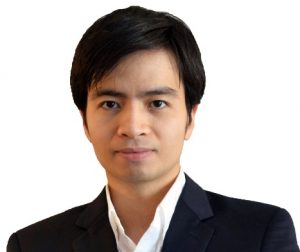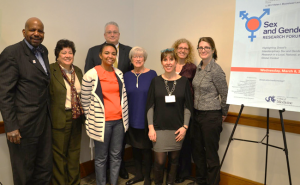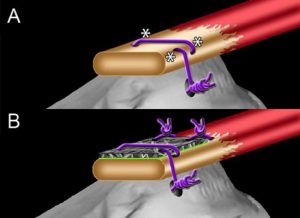By Cato T. Laurencin, M.D., Ph.D.
 The Institute for Regenerative Engineering welcomes Assistant Professor Thanh Nguyen. Dr. Nguyen joined the Departments of Mechanical Engineering and Biomedical Engineering at UConn at the beginning of 2016. His research is highly interdisciplinary and at the interface of biomedicine, materials and nano/micro technology. He did his postdoctoral fellowship with Dr. Robert Langer at MIT. His postdoctoral research involved developing a platform technology which can create 3-dimensional microstructures of biomaterials, such as biodegradable and FDA-approved polymers for applications in vaccine/drug delivery and medical implants. In 2013, Dr. Nguyen obtained his PhD from Princeton University in the department of Mechanical and Aerospace Engineering. There he worked with Dr. Michael McAlpine to develop the field of Biointerfaced Nanopiezoelectrics, which aims to create advanced electromechanical materials/devices at nanoscales that can interface with biological cells/tissues for applications in harvesting, sensing and engineering cellular mechanics. His work has been published in prestigious journals and highlighted in major media such as The New York Times and Nature.
The Institute for Regenerative Engineering welcomes Assistant Professor Thanh Nguyen. Dr. Nguyen joined the Departments of Mechanical Engineering and Biomedical Engineering at UConn at the beginning of 2016. His research is highly interdisciplinary and at the interface of biomedicine, materials and nano/micro technology. He did his postdoctoral fellowship with Dr. Robert Langer at MIT. His postdoctoral research involved developing a platform technology which can create 3-dimensional microstructures of biomaterials, such as biodegradable and FDA-approved polymers for applications in vaccine/drug delivery and medical implants. In 2013, Dr. Nguyen obtained his PhD from Princeton University in the department of Mechanical and Aerospace Engineering. There he worked with Dr. Michael McAlpine to develop the field of Biointerfaced Nanopiezoelectrics, which aims to create advanced electromechanical materials/devices at nanoscales that can interface with biological cells/tissues for applications in harvesting, sensing and engineering cellular mechanics. His work has been published in prestigious journals and highlighted in major media such as The New York Times and Nature.
 The Helen I. Moorehead-Laurencin, M.D., Sex and Gender Research Forum is a very important program of the Institute for Women’s Health and Leadership at Drexel University. This year’s forum took place on March 8, International Women’s Day. This interactive program highlighted Drexel’s interdisciplinary research focused on sex and gender in a local, national and global context. I was excited to give the forum’s opening speech and introduce my beloved late mother, Dr. Helen Laurencin, to the attendees. It was well attended by students, faculty, and staff who represented several different schools and colleges at Drexel, as well as many members of the community. The Forum also received media coverage from the local ABC affiliate, WPVI-TV.
The Helen I. Moorehead-Laurencin, M.D., Sex and Gender Research Forum is a very important program of the Institute for Women’s Health and Leadership at Drexel University. This year’s forum took place on March 8, International Women’s Day. This interactive program highlighted Drexel’s interdisciplinary research focused on sex and gender in a local, national and global context. I was excited to give the forum’s opening speech and introduce my beloved late mother, Dr. Helen Laurencin, to the attendees. It was well attended by students, faculty, and staff who represented several different schools and colleges at Drexel, as well as many members of the community. The Forum also received media coverage from the local ABC affiliate, WPVI-TV. Rotator cuff tears represent a large proportion of musculoskeletal injuries attended by clinics, thereby making rotator cuff repair surgeries one of the most widely performed musculoskeletal procedures. Despite the high incidence rate of rotator cuff tears, operative treatments have provided minimal functional gains and suffer from high re-tear rates.
Rotator cuff tears represent a large proportion of musculoskeletal injuries attended by clinics, thereby making rotator cuff repair surgeries one of the most widely performed musculoskeletal procedures. Despite the high incidence rate of rotator cuff tears, operative treatments have provided minimal functional gains and suffer from high re-tear rates.